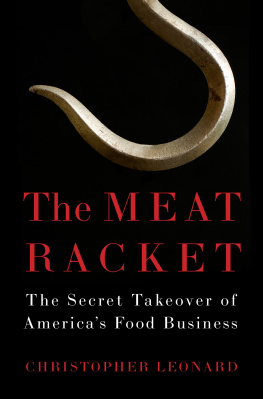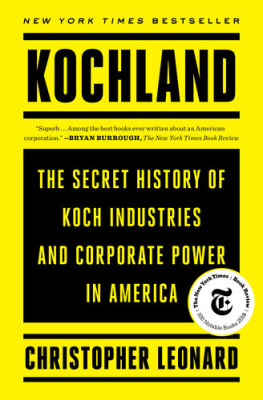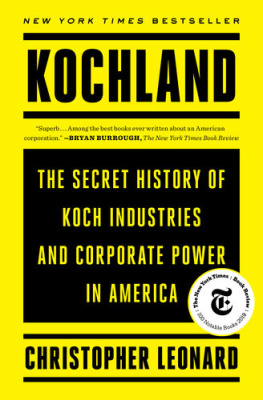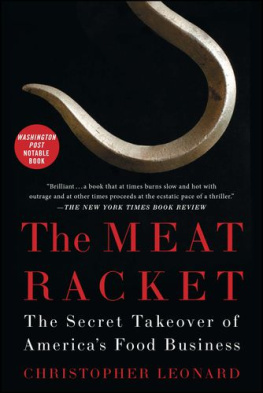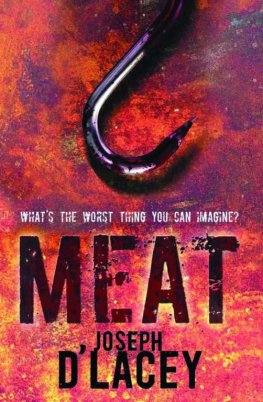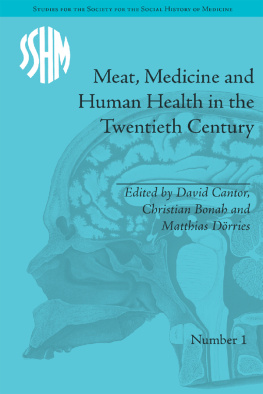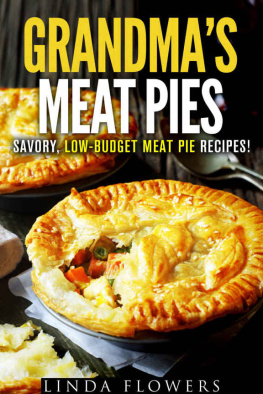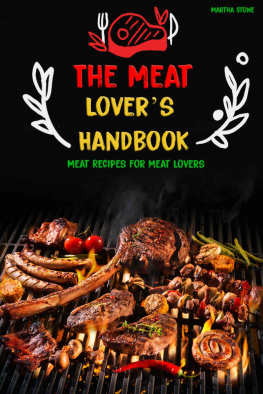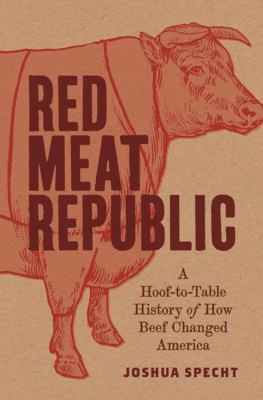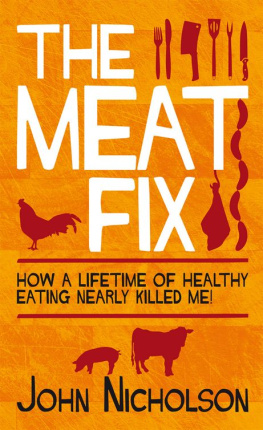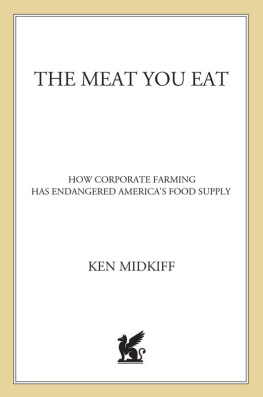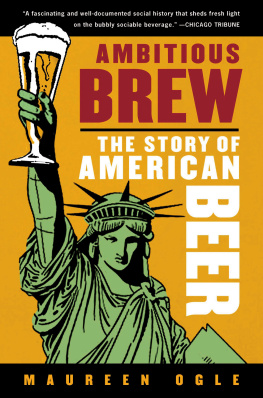
Simon & Schuster
1230 Avenue of the Americas
New York, NY 10020
www.SimonandSchuster.com
Copyright 2014 by Christopher Leonard
All rights reserved, including the right to reproduce this book or portions thereof in any form whatsoever. For information address Simon & Schuster Subsidiary Rights Department, 1230 Avenue of the Americas, New York, NY 10020.
First Simon & Schuster hardcover edition February 2014
SIMON & SCHUSTER and colophon are registered trademarks of Simon & Schuster, Inc.
The Simon & Schuster Speakers Bureau can bring authors to your live event. For more information or to book an event, contact the Simon & Schuster Speakers Bureau at 1-866-248-3049 or visit our website at www.simonspeakers.com.
Interior design by Paul Dippolito
Jacket design by Rex Bonomelli
Jacket photograph FX Micheloud-FXcuisine.com/Getty Images
Library of Congress Cataloging-in-Publication Data
Leonard, Christopher.
The meat racket : the secret takeover of Americas food business / Christopher Leonard.1st ed.
p.cm.
Includes bibliographical references.
Meat industry and tradeUnited States.2. Tyson (Firm)3. Investigative reporting.I. Title.
HD9415.L462014
338.7'636500973dc23
2013040588
ISBN 978-1-4516-4581-1
ISBN 978-1-4516-4584-2 (ebook)
This book is for my father, George Edward Leonard, the finest man whom I have ever known. As they used to say back in the day, Dad: Come now, let us argue it out.
CONTENTS
AUTHORS NOTE
Only quotations that can be confirmed through the authors own notes and observations, or through direct transcripts of an event, are contained within quotation marks. Quotations and dialogue that are recreated from the memory of one or more sources are set aside by a hyphen rather than quotation marks. One name has been changed to protect a source: Perry Edwards is a pseudonym for a source who requested to remain anonymous for fear of retaliation.
Agriculture is our wisest pursuit, because it will in the end contribute most to real wealth, good morals and happiness.
THOMAS JEFFERSON, 1787
Just keep it simple. Kill the chickens, sell em, and make some money.
DON TYSON, 2009
If a (poultry) industry of many firms could only look forward to chronic instability, there might be good reason to accept some concentration. But concentration exacts its price. It has its own consequences. In any honest assessment of the future... those consequences must be taken into account.
HAROLD BREIMYER, 1965
Theyre doomed.
JERRY YANDELL, 2008, COMMENTING ON HIS NEIGHBORS
PROLOGUE
The Hidden King
N OBODY EVER visits the stranded little community of Waldron, Arkansas. But even if they did, a tourist would never see the place for what it really is. Most outsiders would be fooled into thinking it was an actual small town.
On any given morning, the residents awaken and begin their routines along Main Street. Old men park their pickup trucks by the curb in front of the Rock Caf, which opens early for breakfast. As the cafs booths and tables fill up, a congregation of old-timers in cowboy hats gathers in a loose ring of aluminum chairs out front, smoking and talking and stubbing out their cigarette butts in a bucket full of sand. Later in the morning, Chambers Bank on the south end of town opens up and the tellers cheerfully greet customers by name. On Thursday at noon, the livestock auction opens in a cavernous barn on the north side of town, drawing crowds of ranchers who haul steel trailers behind their trucks, with cows staring out between the horizontal slats. In the late afternoon, teenagers park their cars by the gazebo south of the auction barn, proudly displaying their Mustangs and Broncos like big game trophies.
These events have a rhythm of their own, the clockwork functioning of a small-town economy. But its just window dressing. All of it could cease to exist in a moment and have no impact whatsoever on the true Waldron, or its true economic reason for being. The real tempo of the towns economic pulse is measured by the coming and going of semitrucks that roll down Main Street at periodic intervals, twenty-four hours a day, seven days a week. In the middle of the night tanker trucks full of animal feed rumble past the empty stores and out onto country roads that lead into the hilly terrain that surrounds town. At dawn, other trucks trundle in from the hills, heaped high with battered metal crates full of chickens that exude clouds of white feathers along the highway. The tempo can be measured in the regular arrival of train cars full of grains and oilseeds that dump their loads at a feed mill that clanks and hums and churns all night, and in the parade of refrigerated trucks that pull up to a slaughterhouse near the feed mill and get loaded with pallets of frozen meat. This is the real functioning of Waldron, Arkansas, and its true reason for being. This is the heartbeat of Tyson Foods, the nations biggest meat company.
The Tyson plant on the north end of Waldron is the only thing that keeps the town on the map. Appropriately, many residents simply refer to it as the complex. Thats because the Tyson plant isnt just a factory; its more like an entire small-town economy consolidated into one property. The complex contains its own feed mill and hatchery, its own trucking line and a slaughterhouse that covers several acres of land and processes about one million dead chickens a week. The complex is like an economic dark star that has drawn into itself all the independent businesses that used to define a small town like Waldron, the kinds of businesses that were once the economic pillars of rural America.
Of course, tourists to Waldron would never see the Tyson plant, and not just because it sits on the northern fringe of town and away from Main Street. Visitors are stopped at its front gate and forbidden from exploring the grounds. So a tourist would have to be content to stroll along the sidewalks downtown, observing the fake Main Street, the deceptive array of little businesses that make it seem like a community.
This illusory appearance cloaks Tysons existence all the way from its roots in rural America to the grocery store shelves and restaurant menus where its products finally reach consumers. The average shopper is usually fooled when he or she peruses the meat aisle, seeing what appears to be an abundance of choices and products. The Tyson brand name wouldnt necessarily stand out, with its logo gracing just a handful of products. But the rotisserie chicken slowly turning in its oven, the Bonici brand pepperoni, the Lady Aster brand chicken cordon bleu, the frozen chicken pot pie and the Wright Brand bacon all come from the same company: Tyson. And then there is all the unlabeled meat that Tyson floods into the U.S. food system every day: the meat served in cafeterias, nursing homes, fast-food restaurants, and suburban eateries where more and more Americans eat their meals. There is a very good chance any of the meat purchased in these places was made by Tyson. Even if Tyson did not produce a given piece of meat, the consumer is really only picking between different versions of the same commoditized beef, chicken, and pork that is produced through a system Tyson pioneered. Tysons few competitors have resorted to imitating the companys business model just to survive.
This book aims to explore the vast, hidden territory between the remote farms and towns like Waldron where Tyson raises millions of animals, and the final point of contact where consumers buy the companys meat. Unseen between these two poles is a hidden power structure that has quietly reshaped U.S. rural economies while gaining unprecedented control over the nations meat supply. Just a handful of companies produce nearly all the meat consumed in the United States, and Tyson is the king among them. The company sits atop a powerful oligarchy of corporations that determines how animals are raised, how much farmers get paid, and how meat is processed, all while reaping massive profits and remaining almost entirely opaque to the consumer. Because Tyson and its imitators are based in the geographic and economic fringes of America, in forgotten places like Waldron, the company has managed to escape the scrutiny it deserves.

